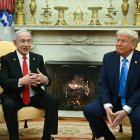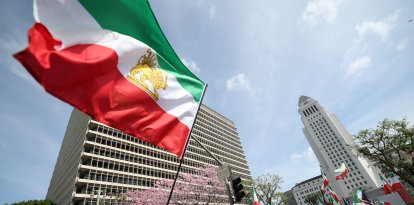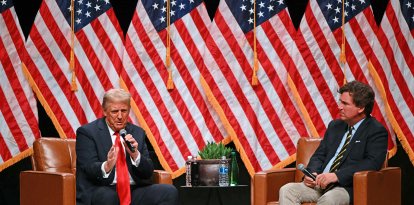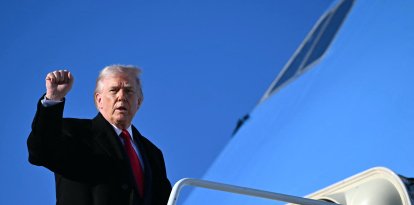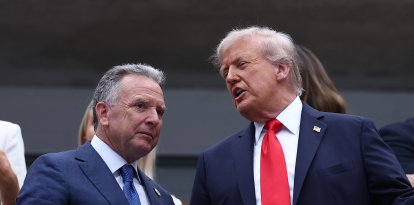Netanyahu vows to Trump: ‘We’ll eliminate tariffs, trade barriers’
The Israeli prime minister said the agreement Jerusalem and Washington reach will be looked at as a model by other countries now seeking to negotiate new trade deals with the Trump administration.

Trump meets Netanyahu at White House, April 2025
Israeli Prime Minister Benjamin Netanyahu arrived at the White House on a rainy Monday afternoon to meet with U.S. President Donald Trump at the White House to seek an amicable resolution to a potential trade crisis between the two countries.
“We will eliminate the trade deficit with the United States. We intend to do it very quickly. We think it’s the right thing to do. And we’re going to also eliminate trade barriers, a variety of trade barriers put up unnecessarily,” Netanyahu said at the Oval Office.
“I recognize the position of the United States that says we’re allowing other countries to put tariffs on us, but we don’t put tariffs on them,” the prime minister said.
Netanyahu said the agreement that Israel and the United States will reach will be looked at as a model by other countries now seeking to negotiate new trade deals with the Trump administration.
“I appreciate very much what you said about the tariffs,” Trump told Netanyahu. “We’ve been ripped off and taken advantage of by many countries over the years, and can’t do it anymore".
“We can’t be the stupid people anymore,” he continued. “And it’s all because of the people that sat at the seat right here. They allowed things to happen to our country that they shouldn’t have allowed to happen on trade and other things.”
Trump said, “We have $36 trillion of debt for a reason. And the reason is that people allowed it to get that way. We lose hundreds of billions of dollars overall—close to $2 trillion.”
‘Lower the cost of living’
Israel was surprised, even shocked, when on April 2, Trump imposed a 17% tax on some Israeli imports despite Israel’s last-ditch effort to avert such tariffs by erasing all its duties on U.S. goods the day before.
America is Israel’s largest trading partner. Bilateral trade between the countries reached $34 billion last year.
Netanyahu said that the day Israel eliminated its tariffs marked “another step … to open the market to competition, to diversify the economy and to lower the cost of living.”
As the move proved too little, too late, the prime minister resolved to fly directly to the United States from Budapest on Sunday, making him the first world leader to meet Trump in person to discuss the matter since the president announced his dramatic shakeup of global trade last Wednesday.
Netanyahu has prided himself on maneuvering Israel’s economy through the COVID-19 crisis and the subsequent war with Hamas.
In Budapest on Friday, he reminded press of OECD Secretary-General Mathias Cormann’s comments during an April 1 meeting in Jerusalem where Cormann praised Israel’s economic resilience.
Tariffs could upend Netanyahu’s achievement. A study by the Manufacturers’ Association of Israel said the tariffs could cost up to 26,000 jobs and reduce Israel’s industrial exports by $2.3 billion yearly.
Ron Tomer, president of the Manufacturers’ Association, told Israeli radio on April 3 that the U.S decision felt like “abandonment by a friend.”
“This move could harm Israel’s economic stability, deter foreign investments in it and weaken the competitiveness of Israeli companies in the American market,” he said.
Israel exports some $22 billion in goods to the United States annually. These include, among others, electrical machinery, medical apparatus and precious metals.
It’s not yet clear what goods the tariffs will affect. Israel hopes that the tariffs will spare business services, which make up nearly half, or 48%, of its exports to America, including the high-tech sector.
Israel will seek to resolve the issue amicably, unlike some countries, such as China and Canada, which have announced reciprocal tariffs. The European Union has as well and is planning additional countermeasures should talks fail.
At an April 3 conference at Herzliya’s Reichman University, Shmuel Abramzon, chief economist at the Israeli Ministry of Finance, said the ministry would continue negotiating.
“We have a good channel with the U.S. administration, and I believe that through dialogue and negotiations, we will succeed in making a change,” he said.
‘It’s our turn to prosper’
Most countries are taking Israel’s route. Kevin Hassett, head of the White House’s National Economic Council, said: “There are more than 50 countries reaching out and trying to negotiate this new status with the president.”
Trump said that they will make “fair deals” with other countries, naming Japan specifically.
At the “Make America Wealthy Again Event” at the Rose Garden last Wednesday, dubbed “liberation day” by the president, the United States announced baseline 10% tariffs on all countries. Some of the territories listed had no local population, such as Diego Garcia Island in the Indian Ocean, home to a joint U.S.-British military base.
The 10% tariffs went into effect on April 5.
About 60 countries that run high trade surpluses, what Trump called the “worst offenders,” received additional tariffs. Washington calculated tariffs for each country by applying a simple formula. The trade deficit with Israel stood at about $7.4 billion in 2024. Those “reciprocal tariffs” go into effect on April 9.
“For decades, our country has been looted, pillaged, raped, and plundered by nations near and far, both friend and foe alike,” Trump said. “But now, it’s our turn to prosper.”
“In many cases, the friend is worse than the foe in terms of trade,” Trump added, holding up a chart of dozens of countries, the top of which included several key U.S. allies, such as Japan, India, Taiwan and South Korea.
“We import virtually all of our computers, phones, televisions and electronics. We used to dominate the field, and now we import it all from different countries,” Trump said.
Trump’s main goal appears to be to bring back U.S. manufacturing. He estimated that it would take “a year-and-a-half to two years” to see the manufacturing fruits of his tariffs.
While it is too early to say if the plan will succeed, on March 24, South Korean carmaker Hyundai announced an investment of $21 billion in the U.S. from 2025 to 2028.
The White House, in a March 4 statement announcing tariffs on steel imports and aluminum imports, said that Nissan might move its production from Mexico to the U.S., that Honda is expected to produce a next-generation Civic hybrid in Indiana, and Stellantis, a car conglomerate, would reopen an assembly line in Illinois.
The statement also listed $2 trillion in new investments, mainly in high-tech. That included a $600 billion declared investment by Saudi Arabia over the next four years.
Trump’s plan has been criticized for what it will cost Americans. According to Business Insider, Ernie Tedeschi, director of economics at the Yale Budget Lab, said increased prices will cost the average consumer household about $3,800 this year.
Trump didn’t deny prices would rise, but said that “it’s to be expected where this is a patient that was very sick.”
“HANG TOUGH, it won’t be easy, but the end result will be historic,” he posted on Truth Social, his social media platform, on April 5.
“More or less every economist not working for Peter Navarro in the White House has lowered estimates of growth in the wake of the Trump tariffs,” reported The Wall Street Journal on Monday.
Trump’s plan even puts him at odds with free-market conservatives, who support him on many other issues. The day Trump announced his tariffs, the Hoover Institution—a conservative think tank at Stanford University—released a video of world-renowned economist Thomas Sowell warning that tariffs could trigger a trade war.
He stated that it’s “painful to see” the administration repeat a “ruinous decision from back in the 1920s.” He referred to the Smoot-Hawley Tariff Act of 1930 meant to protect American farmers and manufacturers, which sparked retaliatory tariffs and the collapse of U.S. trade.
Sowell left some daylight for a positive outcome: If the tariffs are meant as a short-term tactic, for example, as negotiation leverage, to achieve some strategic goals.
“So if this is just a set of short-run ploys for various limited objectives, limited in time, fine, maybe,” he said. “But if you set off a worldwide trade war … everybody loses, because everybody follows suit, and all that happens is you get a great reduction in international trade.”





